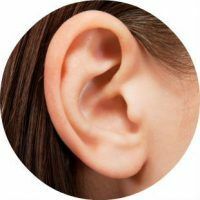
There is nothing wrong with the fact that water gets into your ears if they are completely healthy. Special grease will not allow water to penetrate further into the ear canal, and it will flow out after a while. However, in order to minimize the risk of possible consequences, to reduce discomfort, one can independently accelerate the process of removing water from the ear. So what to do if the ear gets water?
- Why
- hurts How to remove
- How to protect
- How to protect
Experts call this problem "swimmer's ear" and consider one of the most common in the practice of ENT doctors. It is relevant not only in the warm season due to bathing, but also because of year-round visits to swimming pools, careless handling of the ears during shower procedures or bathing a small child.
Why does the
hurt? If water gets into the outer part of the ear - the most common and simple case. Typical symptoms are unpleasant sensations inside the ear canal, a feeling of transfusion and gurgling. Sometimes they can be felt even in the head. It is not necessary to be nervous: if everything is in order with the eardrum - the water will not get further, but gradually it will flow out by itself.
However, even in the outer ear, the presence of water can cause unpleasant consequences: tinnitus, hearing loss, sensation of congestion. To such complications result:
- Swelling of sulfur plug, which covers the auditory meatus. Cope with this problem can only ENT doctor with the help of ear washing.
- Inflammation of the external auditory meatus, which adds to the listed symptoms pain and itching in the ear canal, discharge with an unpleasant odor. To treat inflammation, as a rule, antiseptics and antibiotics are prescribed.
Water entering the middle ear can cause earaches, dizziness, and headaches. In case of fluid entering the middle ear, you should always consult a doctor, as contaminated water can cause an infectious inflammation of the middle ear( otitis).
to contents ^How to remove
To remove water from the outer ear is very simple:
- To jump on one leg. Often on the beaches you can see people who, having bathed in a pond, jump alternately on one or the other leg. They probably dived, and the water hit them in the ear canal. Jumping helps the water to flow more quickly, and by tilting the head to the side, you can reproach the process. During jumping, you can also pull down the ear lobe to straighten the auditory canal and facilitate the water outlet.
- Create a pressure drop by the principle of the pump: close the ear tightly with the palm of your hand, trying to create a vacuum under it, and then abruptly remove the hand. Differential pressure can be created by the example of divers: clamp the nose with your hand, close your mouth and eyes, and try to blow air from your lungs through your ears.
- Lie on your side on the side of the ear, into which water has fallen. During the rest you need to make a few clear and strong swallowing movements, strain the neck muscles in the ear zone.
- Use a cotton swab, more precisely, a piece of fleece wrapped in a thin flagellum( turunda).Vata will quickly absorb the water and after a few minutes the outer ear will be dry.
Removing water from the middle ear presents certain difficulties, so it is better to address this problem to an ENT specialist. Tightening with getting rid of water can lead to various problems with the ears. However, if there is no possibility to visit the otolaryngologist at once, you can try to solve the problem yourself:
- Immerse anti-inflammatory drops( Otypax or Otinum) or insert into the ear of the turunda, pre-moistened with warm boric alcohol.
- Put warming compress on your ear for the night, for example, with a wool scarf.
- Take pain medication if you have painful sensations before visiting a doctor.
Child
Children often get hurt from getting water in their ears, as they have an auditory process shorter and wider than that of an adult. Especially dangerous are swimming and diving for children who have recently had otitis or who have this disease in a chronic recurrent form. For this reason, parents should pay increased attention to the removal of water from the ears after each bathing of their child.
Children's doctors say that there is nothing wrong with getting water into the ears of newborns and babies: in the womb they are constantly in the water. However, it is a sterile liquid that does not cause infection. At the same time, children have a habit of feeling fluid in the ear for the first time after birth. After active water procedures or visiting the baby's pool, it is advisable to hold the baby on each side for several minutes, so that the water from the ears will flow out under the influence of the earth's gravity.
Ears of small children protect and sulfur discharge in the ear canals, which in this tender age are formed very quickly. Therefore, it is recommended to clean the ears only after bathing.
How to protect
Toprevent liquid from entering the ears, the occurrence of unpleasant sensations, as well as the development of complications, while swimming in water reservoirs and swimming pools should be protected from water. To do this, you can use a special bathing cap, which can be purchased at any sports store. The main criterion of its choice is the density of adherence to the ears.
If you do not have the opportunity to wear a hat, then you can grease the entrances into the ear canals with petroleum jelly, it will not allow the penetration of liquid deep into the ears.
Special ear plugs can also be purchased in stores, which are inserted into ears or headphones to protect them from water.
